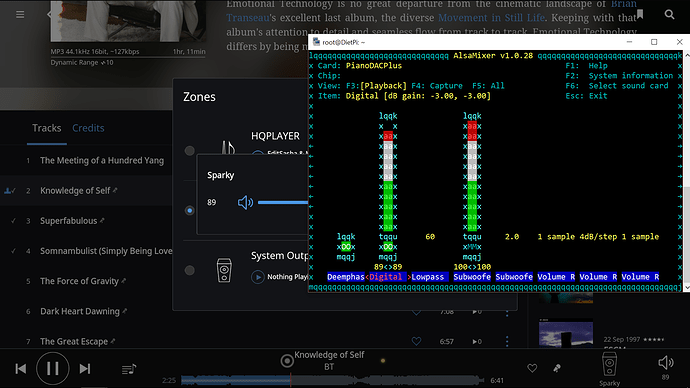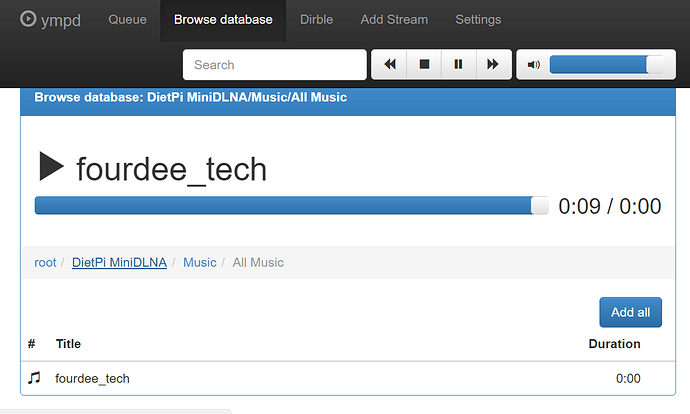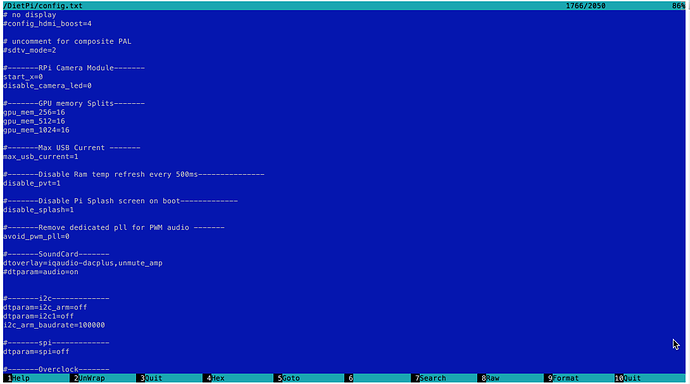The problem with this is, that the Roon app on iOS has no audio output capabilities yet. That’s why I am looking at the Pi.
I also found workaround, if the attempt with the pi fails: There are also mini-jack to bluetooth transmitters, that I could use… 
I see, sorry about that. I am on Android and was not aware of that limitation on iOS.
Sure is practical to be able to listen through a phone or tablet.
I actually have one of those bluetooth devices as well (mpow streambot) which I think can transmit and receive, but have not used it yet.
Yep, volume control works from Roon. If you get any clipping, set volume to -3dB/89 in Roon (seems a good value):
EDIT:
Subwoofer RCA volume, and, mode (eg: 2.0 off, 2.1 mono, 2.2 stereo) can only be controlled from alsamixer, or dietpi-justboom at this time:
Have you compared the sound of an SBC with the Audioquest Dragonfly Black (current version) to the Allo Vana Player Bundle?
Unfortunately, I do not have a AudioQuest Dragonfly, so unable to comment. Added to my wish list ![]()
@crieke this is what I was trying to do with making MPD a DLNA/ UPNP client as above. This worked with a Beaglebone black installation from Computer Audiophile, but can’t get it working with DietPi on the RPi3.
Any other ideas @Dan_Knight?
Binary has been compiled with the upnp plugin and enabled as per documentation (MPD as client to an UPnP/DLNA Media Server). Although, documentation is a little sparse.
In theory, should be “good to go”.
Once mpd is running, your client should see a list of the network Media Servers as the top level directory.
Ok, got it working:
- Install MPD + YMPD on system which you want as client upnp
- Install MiniDLNA on another SBC
- Configure MPD config for upnp: https://github.com/Fourdee/DietPi/issues/821#issuecomment-288057932
You should then see:
EDIT: Its also worth noting MPD isn’t really related to Roon and on-topic. Ideally, our forums may be a more sensible location for this discussion: DietPi Community Forum - Welcome to the DietPi OS Community Forum
True, except that it is about having the two run together on a single installation. Much like getting RoonBridge to run on a Volumio distribution so as to have flexibility. But point taken.
I do!. Thanks for implementing this. I still can’t see the endpoint from third party controllers, but this does work in a limited way. Not sure it is bit-perfect, though. It works, but sound quality is not up to speed. Odd. I’ll follow up on your forum to see what tweaks might help.
Yep, nothing against this and I agree ![]() . Although, at a glance to anyone not aware, this does look “non-Roon related”. Just me trying to ensure we keep this thread Roon related for the mods.
. Although, at a glance to anyone not aware, this does look “non-Roon related”. Just me trying to ensure we keep this thread Roon related for the mods.
I do!. Thanks for implementing this. I still can’t see the endpoint from third party controllers, but this does work in a limited way. Not sure it is bit-perfect, though. It works, but sound quality is not up to speed. Odd. I’ll follow up on your forum to see what tweaks might help.
Excellent, great to hear. No worries, post away and we’ll continue discussion.
Hi, many thanks to Dan for his work in creating DietPi. I just got my RPi 3 yesterday with IQAudioDac Pro and installed it with DietPi using the Roon dietpi.txt configuration file which automated the process very nicely. Prior to insalling the micro SD card in the Pi, I edited the cinfig.txt file to include the info from IQAudio about the soundcard setting. So I disabled the on board card and added the parameter for the IQAudioDac+ (also used for the IQAudioDac Pro).
#-------SoundCard-------
dtoverlay=iqaudio-dacplus,unmute_amp
#dtparam=audio=on
When the system booted up and the updates were completed I went to dietpi-config to set the sound card up, but the display did not show the IQAudio dac. Below is a screen shot of what is displayed for options.

Wondering whether it would work with Roon, I fired up Roon and yes, all is good:
The config.txt loaded in RAM still shows my entry for the sound card, not the options as previously shown in this thread.
It works great, just not sure why DietPi didn’t pick up the card and present it as an option - or did my making the entry in the config.txt prevent this?
Again, Dan, thanks for the great product, and help you provide.
Thanks,
Rick
When you are in the DietPi-config menu, highlight the soundcard option (as in your screenshot) and hit enter/return on your keyboard - does a list of card options show up then?
I didn’t try, was afraid I might wreck something by not being able to undo it. I’ll give it a try now and report back.
thanks
Do I feel silly 


rebooting now…
All works well.
Thanks!
It’s a pretty resilient program- even my clumsy efforts have not been able to break it! Choosing that option should give you a list of Pi hats and an option to choose a USB dac. There is an option too for no sound card. It’s useful to load this one first to turn off the sound output on the Pi itself. Then reboot and choose the hat/reboot.
Ah I see you’ve done it…well done 
I just checked the config.txt and see it turned the Pi sound card back on, and removed my parameter for the unmute. I’ll try removing the onboard sound card via the menu, then manually add the unmute parameter.
Further “exploration” revealed an option for the IQAudioDacplus and the unmute parameter in the menu further down  Selected it and rebooted.
Selected it and rebooted.
thanks
First I want to thank Rene and Dan for the great contributions and your assistance to folks like me who are just stating to get their toes wet with Rpi and Dietpi.
Over the weekend I managed to install a Raspberry Pi3 running Dietpi and with RoonBridge enabled. The unit is working great. Later this week I plan to add a HAT (Digi+) but right now I am enjoying my new Roon EndPoint.
I encountered a few issues during installation and will share just in case that someone can benefit.
- When I first tried to access the unit via Terminal from a Mac (ssh root@), I was not allowed to connect. After some reading I learned that I had to add a text file in the root directory named “ssh” that basically told the Raspberry unit to allow remote access via ssh. Apparently, this is a security feature that Raspberry started a few months ago. It took me a while to find this out.
- Also someone suggested that I reformat the card and reinstall dietpi which I did. The problem is that most instructions are given assuming that one runs windows or linux machines. Being a Mac user, it took me a bit of googling to find the equivalent software to do the extracting of the dietpi file (Unarchiver), reformatting the micro SD card (SD Formatter), and flashing the dietpi image to the card (Etcher).
- Once I accessed dietpi, it took me a while to understand the different menus and the MS-DOS-like non-graphical user interface. By the time that I found out the Prompt 2 was an option to help me navigate and communicate with the Raspberry/Dietpi, I had already installed RoonBridge and had no need for it.
Now that I have done it once, I feel that I can repeat the process in just a fraction of the time.
Thanks again to Rene and Dan!
In response to item 2 on your list, I have had great success with ApplePi-Baker. This performs all of the necessary functions to extract, format, and write an image (such as DietPi) to a SD card from a pretty straightforward GUI on a Mac.
Edit: Be warned that the software will ask you to input your admin password upon launch. This is because it is essentially executing command line functions for disk formatting under the hood, which would normally require admin privileges.
How to update Roon Bridge 1.0 (build 81) stable?
I have a version DietPi 148, Roon 1.3 (build 217) alpha.
Both of my DietPi installations updated RoonBridge successfully from build 75 to build 81.
DietPi 148, Roon 1.3 (build 216) stable running on Synology DS1515+
The 217 alpha build could be at fault, or perhaps there was a temporary internet issue during your attempted update, either on your end or Roon’s. To test the former, is it possible to revert to 1.3.216, then update the Bridges to b81?
DietPi 148, Roon 1.3 (build 209/216) stable running OS X 10.12.4 problem updated Roon Bridge build 81.
I installed a new dietpi.
It works build 81.
Hi, am using a Teradak Teralink X2 USB to SPDIF interface - works fine on another linux platform, but am having difficulties with DietPi on a RaspberryPi. Selected the generic USB audio driver. Is there anything else that should be configured for this interface ? Thanks






